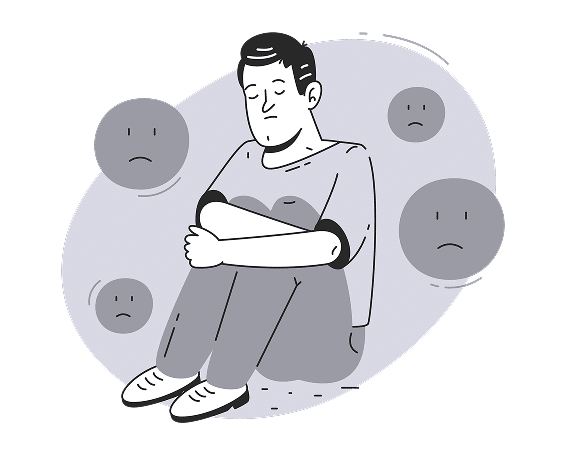PTSD and Adjustment Disorder Treatment Online
Expert Virtual Mental Health Care Across 8 States
Stress is a normal part of life but sometimes, even expected changes like a move, a breakup, or job shift can overwhelm your ability to cope. When emotional or physical symptoms become disruptive, it may be more than just stress – it could be an adjustment disorder. At Lifetime Insight, we provide compassionate, evidence-based psychiatric care tailored to life transitions.
Post-Traumatic Stress Disorder (PTSD) is a serious mental health condition that can follow exposure to trauma – whether sudden or prolonged. It can feel like you’re always on edge, reliving painful memories, avoiding people or places, or struggling to feel safe in your own body. At Lifetime Insight, we treat PTSD with deep respect for the intensity of your symptoms and the uniqueness of your experience. Whether trauma stemmed from abuse, violence, illness, or life-threatening events, we provide trauma-informed psychiatric care that integrates medication, psychotherapy, and lifestyle support — all with compassion and clinical expertise.
We provide virtual, online care for adults in several states — California, Florida, Nevada, Virginia, Colorado, Kansas, Iowa, and Nebraska, offering personalized treatment that meets you where you are – no long commutes, no crowded waiting rooms, and no unnecessary delays. Whether you’re seeing support for PTSD or adjustment related stress, you can access compassionate psychiatric care when – and where – you need it most.


What Is an Adjustment Disorder?
An adjustment disorder is a short-term mental health condition that develops in response to a significant life change or stressful event. It can occur after experiences such as:
- Divorce or relationship changes
- Job loss or career changes
- Relocating to a new city or country
- Serious illness or injury
- Loss of a loved one
- Major life transitions (e.g., retirement, becoming a parent)
The emotional and behavioral responses in adjustment disorders are more intense than expected for the situation and can interfere with daily life.
What is PTSD?
Post-Traumatic Stress Disorder (PTSD) is a serious mental health condition that can develop after experiencing or witnessing a traumatic event. While everyone has a stress response to difficult situations, PTSD involves lasting psychological and physical symptoms that interfere with daily life.
PTSD can result from events such as:
- Physical or sexual assault
- Military combat or exposure to war zones
- Natural disasters (e.g., earthquakes, fires, floods)
- Severe accidents or injuries
- Childhood abuse or neglect
- Medical trauma or life-threatening diagnoses
- Witnessing death, violence, or overwhelming suffering
Unlike adjustment disorders, PTSD can emerge weeks or months after the trauma and is often more severe and persistent. It may involve flashbacks, nightmares, emotional numbness, and extreme avoidance of reminders. People with PTSD often feel stuck in survival mode, reliving the event or living in constant fear that it will happen again.
You don’t need to go through it alone. PTSD is treatable with the right support, and healing is possible.

Common Signs & Symptoms
The symptoms of PTSD and adjustment disorder can overlap, but the intensity, duration, and cause often differ. While adjustment disorder tends to arise shortly after a major stressor and is generally short-term, PTSD can develop after a traumatic event and may persist for months or years if untreated. Common symptoms include:
- Persistent sadness, tearfulness, or hopelessness
- Excessive worry or anxiety
- Flashbacks or intrusive memories (more common in PTSD)
- Nightmares or sleep disturbances
- Trouble concentrating
- Loss of interest in usual activities
- Irritability, anger, or emotional numbness
- Hypervigilance or exaggerated startle response (PTSD-specific)
- Social withdrawal or isolation
- Feeling overwhelmed or unable to cope
If these symptoms are interfering with your daily life – whether they started after a makor life stressor or a traumatic experience – online treatment can help you feel more in control again.
How We Provide Online PTSD and Adjustment Disorder Treatment
Our psychiatrists approach PTSD and adjustment disorders with personalized care, aiming to reduce distress, rebuild a sense of safety, improve resilience, and help you adapt and heal after trauma or major life stressors.
Comprehensive Telepsychiatry Evaluation
Your first visit is a 55-minute in-depth session. We’ll explore your symptoms, personal history, trauma or stress triggers, and any co-occurring concerns such as anxiety, depression, or insomnia.
Integrative Treatment Plans
When appropriate, short-term or ongoing treatments are proposed to support stabilization, ease intrusive thoughts, or improve sleep. All treatment plans are tailored and closely monitored.
Psychotherapy Integration
While we don’t have in-house therapists, our psychiatrists are trained in psychotherapy and integrate these techniques into treatment sessions when appropriate. In some cases, we may also be able to provide ongoing therapy alongside traditional management, depending on availability and clinical fit. For patients seeking additional support, we are happy to refer you to trusted therapists in our extended network. We recommend evidence based approaches such as EMDR (Eye Movement Desensitization and Reprocessing), Cognitive Processing Therapy (CPT), or stress-focused Cognitive Behavioral Therapy (CBT) – all effective in treating PTSD and adjustment disorders.
Lifestyle & Coping Strategies
- Grounding techniques and mindfulness to reduce flashbacks or intrusive thoughts
- Gentle physical activity to support emotional regulation and sleep
- Sleep hygiene guidance for nightmares and insomnia
- Building support systems through friends, family, or community groups
- Structured routines to rebuild stability and a sense of control
- Personalized supplementation (via Fullscript or VitaminLab)
Is It PTSD, Adjustment Disorder, or Something Else?
Symptoms like anxiety, low mood, irritability, or trouble sleeping can show up in many conditions—including adjustment disorder, post-traumatic stress disorder (PTSD), depression, or even medical issues. Understanding whether you’re facing an adjustment disorder, PTSD, or clinical depression is the first step toward getting the right care. Our board-certified psychiatrists take time to understand whether your symptoms are:
- Triggered by a recent life stressor (suggesting adjustment disorder)
- A reaction to a traumatic event, with ongoing distress or hypervigilance (suggesting PTSD)
- Related to another medical or neurological condition
Getting the correct diagnosis ensures you receive the most effective treatment.


When to Reach Out for Help
You should consider seeking help for stress or trauma if:
- You’re having trouble managing emotions after a major life change
- You feel stuck or overwhelmed and can’t seem to move forward
- Symptoms are interfering with work, relationships, or daily activities
- You’re struggling to manage emotions after a major life transition or stressful event
- You’ve noticed changes in sleep, appetite, or mood
Early treatment can help prevent symptoms from worsening and reduce the risk of developing a more serious mental health condition.
Insurance, Self-Pay & States We Serve
We offer secure, HIPAA-compliant video sessions for adults in California, Florida, Nevada, Nebraska, Virginia, Colorado, Kansas, and Iowa.
- We accept most insurance plans, including Blue Cross, Blue Shield, Cigna, Aetna, and Anthem.
- We are a proud Lyra Health partner, offering no-cost care through select employer-sponsored plans.
- Self-pay rates: $495 for initial evaluations, $235 for follow-up visits.
*Please note: We do not accept Medicare, Medicaid, Tricare, or UMR/Optum. UMR/Optum
Why Choose Lifetime Insight?
Care from board-certified psychiatrists experienced in treating PTSD and adjustment disorders
No app downloads, join securely from your browser
Appointments typically available within a week
Personalized, whole-person care plans
Consistent relationships and direct support between visits
Take the First Step Toward Resilience
A major life event or traumatic experience can shake your sense of safety, stability, and self. Whether you’re navigating the aftermath of a personal loss, job change, divorce, or a traumatic event, you’re not alone – and you don’t have to stay stuck.
Our board-certified psychiatrists specialize in treating adjustment disorders and post-traumatic stress disorder (PTSD) with compassion, precision, and evidence-based care. Through personalized online treatment, we help you regain your balance, rebuild emotional resilience, and move forward – at your pace.
Schedule your first appointment and take the first step toward healing, growth, and renewed confidence.
Latest Insights on Mental Health & Recovery

Low Dopamine: The Hidden Symptoms—and How to Feel Better
What Does Low Dopamine Really Feel Like? By Sarit Hovav, MD, FAPAPublished October 24, 2025 Facebook X-twitter Linkedin Envelope Low dopamine doesn’t always feel like

Inflammation and Depression: The Hidden Causes—and How to Feel Better
Beyond Brain Chemistry: The Body’s Role in Depression Feeling persistently low, foggy, or fatigued — even when life looks “fine” on paper — might not

CTE (Chronic Traumatic Encephalopathy): The Hidden Symptoms—And How to Heal
Caring for your brain health doesn’t end when the game does.If you’re a former athlete—or someone who loves one—and you’ve noticed mood swings, memory loss,
